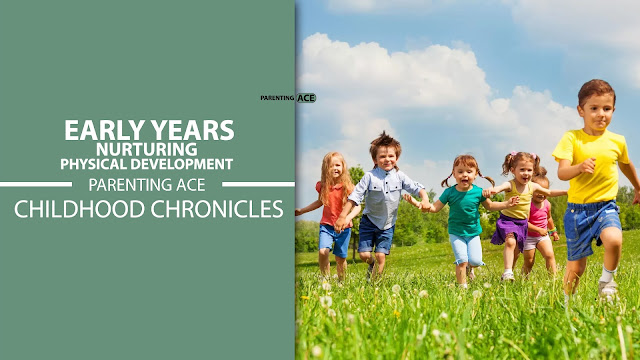Early Years: Nurturing Healthy Foundations for Physical Development in Children
In the intricate tapestry of parenting, there exists a foundational thread that weaves through every aspect of a child's journey: nurturing their physical development in the early years. Welcome to our blog post, where we embark on a journey into the realm of early childhood physical development. From the delicate milestones of infancy to the bounding energy of preschool years, we explore the significance of this period in shaping a child's physical capabilities and overall well-being. Join us as we delve into the role of parents as stewards of healthy habits, creators of safe environments, and champions of exploration and play, all vital components in laying the groundwork for a lifetime of physical vitality and strength.
 |
| Early Years: Nurturing Physical Development |
The early years of a child's life are pivotal in laying the foundation for their physical development. During this crucial period, parents play a fundamental role in nurturing healthy habits and providing opportunities for growth and exploration. In this comprehensive article, we delve into the importance of early childhood physical development, explore key milestones, and offer practical tips for parents to support their children's physical well-being.
Understanding Early Childhood Physical Development
Physical development in early childhood encompasses various aspects, including gross motor skills, fine motor skills, coordination, and sensory integration. From infancy through preschool age, children undergo rapid growth and development, marked by significant milestones such as rolling over, crawling, walking, and refining motor skills. These early experiences lay the groundwork for later physical abilities and overall health.
The Role of Parents in Nurturing Physical Development
Parents play a critical role in fostering their child's physical development from the earliest stages of life. Through responsive caregiving, providing a safe and stimulating environment, and encouraging exploration and movement, parents can support the development of strength, coordination, and balance. Simple activities such as tummy time, playing with age-appropriate toys, and outdoor play promote the development of motor skills and physical fitness.
Promoting Healthy Habits
Establishing healthy habits early in life is essential for long-term physical well-being. Parents can promote healthy eating habits by offering nutritious meals and snacks, modeling healthy eating behaviors, and involving children in meal preparation. Encouraging regular physical activity through active play, sports, and outdoor recreation helps children develop strength, endurance, and cardiovascular fitness. Additionally, ensuring adequate rest and sleep is crucial for supporting growth and overall health.
Creating a Safe Environment
Creating a safe environment is paramount for promoting physical development and preventing injuries. Parents should childproof their home to minimize risks, such as securing furniture, covering electrical outlets, and installing safety gates and window guards. Supervision is key, especially during activities that involve climbing, running, or using playground equipment. By taking proactive measures to ensure safety, parents can provide children with the freedom to explore and move with confidence.
Encouraging Exploration and Play
Play is essential for children's physical development, providing opportunities for movement, social interaction, and learning. Parents can encourage exploration and play by providing age-appropriate toys, games, and activities that stimulate gross and fine motor skills. Outdoor play offers numerous benefits, allowing children to engage in active play, experience nature, and develop physical confidence and competence.
Monitoring Developmental Milestones
Parents should monitor their child's physical development and seek professional guidance if they have concerns about delays or abnormalities. Regular well-child visits with a pediatrician or healthcare provider provide opportunities to track growth, motor skills, and overall development. Early identification and intervention can address any underlying issues and ensure children receive the support they need to thrive.
The early years of childhood are a critical period for nurturing healthy foundations for physical development. By providing a supportive environment, promoting healthy habits, and encouraging exploration and play, parents can lay the groundwork for their child's lifelong physical well-being. Through attentive caregiving and proactive measures, parents can empower their children to reach their full physical potential and embrace a lifetime of health and vitality.



Comments
Post a Comment